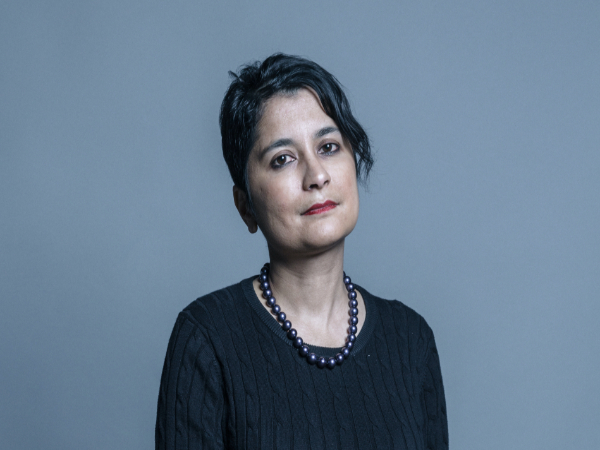Baroness Chakrabarti: A Trailblazer in Law, Politics, and Human Rights
The Inspiring Journey of Sharmishta "Shami" Chakrabarti

Baroness Chakrabarti, born Sharmishta Chakrabarti on June 16, 1969, is a British politician, barrister, and human rights activist. A Labour Party member and life peer in the House of Lords, she is best known for serving as the Director of Liberty, the leading human rights organization in the UK, from 2003 to 2016. Renowned for her fearless defense of civil liberties, Baroness Chakrabarti has shaped debates on equality, freedom, and justice in the United Kingdom and beyond.
Early Life and Education
Baroness Shami Chakrabarti was born in Harrow, London, into a Bengali family originally from Kolkata, India. Her upbringing was deeply rooted in values of fairness, justice, and education, which would later inspire her professional journey. Raised in a middle-class household, she understood from a young age the importance of social responsibility and standing up for what is right.
She attended a local state school before pursuing her higher education at the prestigious London School of Economics (LSE). At LSE, she studied law and excelled academically. Her decision to enter the legal profession was driven by a passion for defending the vulnerable and ensuring justice for all. She was called to the Bar in 1994, marking the beginning of what would become a distinguished legal and political career.
Baroness Chakrabarti Age
As of 2025, Baroness Chakrabarti is 56 years old. Born on June 16, 1969, she has spent more than three decades contributing to the fields of law, civil rights, and politics. Her age reflects the wealth of experience she brings to her ongoing work as a legislator, public speaker, and advocate for human rights. Despite having crossed the mid-50s milestone, she remains as active and influential as ever, proving that passion and commitment have no expiration date.
Legal Career and Entry into Public Life
Before entering the spotlight, Chakrabarti worked as a lawyer in the Home Office, where she gained firsthand experience with legislation, governance, and state policies. Her work at the Home Office gave her deep insight into how laws impact citizens, especially when it comes to issues of security and civil liberties.
Her career took a transformative turn in 2001 when she joined Liberty (the National Council for Civil Liberties). Initially brought in as in-house counsel, she quickly rose to prominence within the organization. Just two years later, in 2003, she became its Director, succeeding John Wadham. This position became the defining role of her career and thrust her into the national spotlight as one of the UK’s most vocal and visible human rights defenders.
Baroness Chakrabarti and Liberty
During her 13-year tenure as Director of Liberty, Baroness Chakrabarti became a household name. She fearlessly challenged government policies that threatened individual freedoms and civil rights, particularly in the wake of post-9/11 counterterrorism laws. She frequently appeared on national television and radio, becoming a trusted voice on matters of justice, surveillance, and equality.
Under her leadership, Liberty expanded its reach and influence, challenging discriminatory policies and standing up against oppressive legislation. She was particularly critical of mass surveillance, indefinite detention without trial, and excessive counterterrorism measures. Her work helped shape the public debate around the balance between national security and civil liberties.
Transition into Politics
In 2016, Shami Chakrabarti was elevated to the peerage as Baroness Chakrabarti of Kennington in the London Borough of Lambeth. She entered the House of Lords as a Labour peer, bringing her expertise in law and human rights directly into the legislative process.
Later that same year, Labour leader Jeremy Corbyn appointed her as the Shadow Attorney General for England and Wales. In this role, she became a key figure in shaping Labour’s legal and constitutional policies, particularly around human rights and social justice. She served in the position until 2020, when she stepped down following the change in party leadership.
Baroness Chakrabarti Family
Baroness Chakrabarti has always maintained a strong sense of privacy when it comes to her personal life. She was married to Martyn Hopper, with whom she has a son. While her professional achievements have often taken center stage, her role as a mother has been equally important to her identity.
Despite the pressures of public life, she has spoken candidly about the challenges of balancing career and family responsibilities. Her decision to send her son to a private school sparked public debate, as critics questioned the consistency of her political and personal choices. She defended her decision by highlighting the imperfections of the education system and reaffirmed her commitment to broader social equality.
Her family remains a vital support system, grounding her amidst the challenges of political and legal life.
Baroness Chakrabarti Net Worth
While Baroness Chakrabarti’s net worth is not publicly disclosed with precision, estimates place it in the range of $1 million to $5 million. Her income sources include her work as a barrister, her years as Director of Liberty, her role in the House of Lords, and her numerous publications.
She is the author of influential books, including On Liberty (2014), Of Women (2017), and Human Rights: The Case for the Defence (2024). These works have not only contributed to public discourse but also added to her financial stability. While not among the wealthiest figures in politics, her influence, reputation, and credibility are far more significant than material wealth.
Baroness Chakrabarti Wikipedia
According to Baroness Chakrabarti’s Wikipedia entry, she is officially described as a British politician, barrister, and human rights activist. The entry emphasizes her leadership at Liberty, her role as a Labour peer, and her contributions to debates on freedom, equality, and justice.
Wikipedia provides a concise overview of her life, including her birth date, education at the London School of Economics, career highlights, and honours such as her appointment as Commander of the Order of the British Empire (CBE) in 2007. It also covers her peerage and her tenure in the Labour Party’s front bench as Shadow Attorney General.
Recognition and Awards
Baroness Chakrabarti’s work has earned her numerous accolades:
CBE (Commander of the Order of the British Empire) in 2007.
British Academy President’s Medal in 2011 for contributions to civil liberties.
Listed multiple times among the most powerful women in the UK.
She is also a frequent speaker at universities, think tanks, and international conferences, where she continues to inspire young lawyers, activists, and politicians.
Writing and Thought Leadership
Baroness Chakrabarti is a prolific writer whose books and articles have influenced both policy and public opinion. Her writing is clear, persuasive, and rooted in a deep moral conviction. She argues passionately for human dignity, gender equality, and civil rights, often challenging governments and institutions to do better.
Her 2017 book, Of Women, explored global gender inequality, while her more recent work, Human Rights: The Case for the Defence (2024), is a timely reminder of why human rights must remain central in public life, especially amid global challenges such as populism, authoritarianism, and technological surveillance.
Legacy and Continuing Influence
Even after stepping back from frontline politics, Baroness Chakrabarti remains a formidable force in British public life. Her legal expertise, moral clarity, and commitment to fairness ensure that she continues to shape debates on civil liberties.
Her legacy is not just about the positions she has held but about the principles she has consistently defended: fairness, justice, equality, and freedom. Whether through her speeches in the House of Lords, her books, or her media appearances, she continues to inspire a generation of activists and leaders.
Conclusion
Baroness Chakrabarti stands as one of the most influential voices for human rights and civil liberties in modern Britain. From her early days at the Home Office to her transformative leadership of Liberty, from her peerage in the House of Lords to her influential writings, her journey is one of dedication, courage, and principle.
Her age underscores her decades of contribution, her family illustrates her personal grounding, her net worth reflects a life of service more than material accumulation, and her Wikipedia entry captures her public legacy. But beyond the facts and titles, Baroness Chakrabarti embodies the enduring fight for justice — a reminder that the defense of human rights is a lifelong mission.



